Iranian Dissident Journalist Detained Again After Being Assaulted
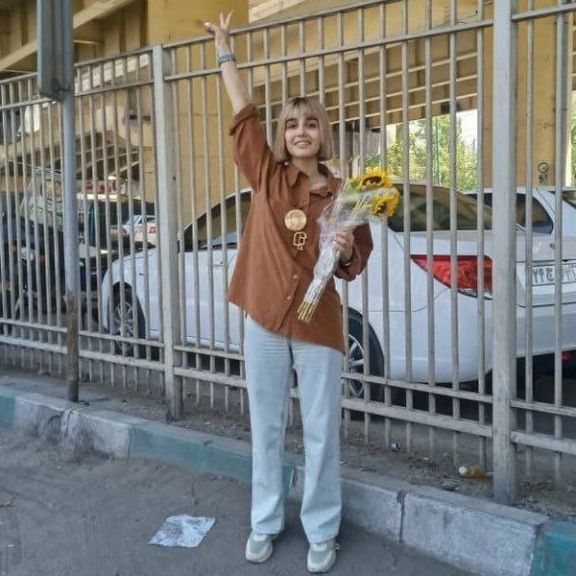
Journalist Nazila Maroufian, who was released on bail just days ago, has been arrested again and detained in Qarchak prison.

Journalist Nazila Maroufian, who was released on bail just days ago, has been arrested again and detained in Qarchak prison.
The journalist, who is also a student at Allameh Tabatabai University in Tehran, was arrested in July following a summons to the Prosecutor's Office at Evin prison.
After being released on bail on Sunday, she went to a police station to retrieve her mobile phone and was allegedly attacked by law enforcement officers. A witness reported that an officer struck Maroufian on the back of her head. Maroufian’s mother, who was with her, compared her daughter's treatment to the tragic case of Mahsa Amini, who died while in the custody of the morality police. The officer replied, "Yes, just like we killed her, we will kill this one as well."
Both mother and daughter were arrested and detained although Maroufian's mother was later released. The journalist herself was transferred to a quarantine ward within Qarchak prison, south of Tehran, based on a temporary arrest warrant.
Her initial arrest came after security agents from the Ministry of Intelligence raided Maroufian's home and summoned her to the prosecutor's office.
Maroufian was previously employed by the moderate Iranian news website Rouydad 24, which had been a reliable source of news about developments in Iran. In March, the Iranian regime temporarily blocked access to the website after it published an interview with Amjad Amini, the father of Mahsa (Zina) Amini.
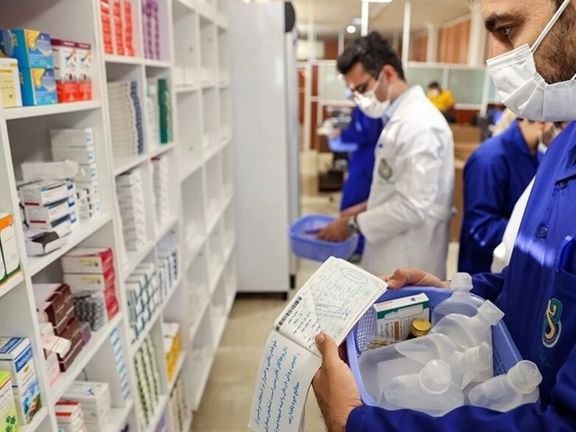
In a recent surge of repression against the Baha'i community Iranian security have arrested nine citizens in Tehran and closed 40 drugstores and warehouses owned by Baha’is.
The Ministry of Intelligence of the Islamic Republic divulged details in a formal statement on Sunday, revealing the nature of the arrests. "The detained Baha'i family and their accomplices were engaged in the realm of medicines and cosmetics, " according to the Ministry.
Baha'i activists shared additional insights with Radio Farda, the Persian Service of Radio Free Europe in Prague, identifying those affected by the crackdown. These sources indicated that the Ministry of Intelligence agents conducted visits to the Tabibian family's pharmacies and warehouses, during which, they also confiscated communication devices belonging to some employees.
The ministry cited various accusations against the detained individuals, including "drug smuggling and hoarding, money laundering, and tax evasion." As a result, the security agency reported the seizure of "20 pharmacies and 3 cosmetics companies and warehouses" linked to the Tabibian family. Usually in such cases seized assets end up in the hands of regime organizations and insiders.
Over the years, the Islamic Republic's security entities have subjected adherents of the Baha'i faith to undue pressure, often under the pretext of security concerns. These actions have frequently culminated in the confiscation or seizure of their properties.
The ongoing plight of Baha'is in Iran continues to raise international concerns. Presently, three members of Yaran-e Iran, a Baha’i community group remain incarcerated under security-related orders.
The Islamic Republic of Iran refuses to acknowledge the Baha'i faith, and the followers of this religion have been subjected to extensive restrictions and hardships since 1979.
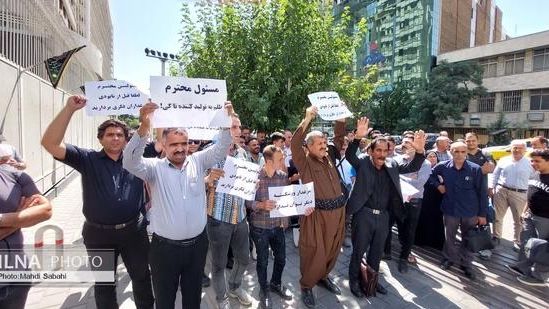
Iranian poultry farmers gathered outside the Ministry of Agriculture on Saturday to protest government's failure to deliver essential animal feed.
Despite having paid for soybean and corn inputs over a year ago, the group of angry farmers from poultry production units in Qazvin province, have not received their orders from the Ministry of Agriculture, nor have they been reimbursed. Their accrued losses over this period amount to 100,000 billion rials ($200 million).
The protestors held placards berating the Ministry for placing them in a crippling financial situation and that they had reached breaking point.
They also raised additional concerns at the practice of government agencies buying their produced poultry at slashed prices using coercive measures and threats.
Supply of livestock and poultry production inputs is a systemic and ongoing issue. It has been more than a year since subsidies were reduced and cuts were made to the allocation of discounted foreign currency to essential goods importers. This has resulted in a disturbing cycle of shortages, delivery delays, and outright unavailability of necessary production inputs, negatively impacting the livelihoods of the country's livestock and poultry producers.
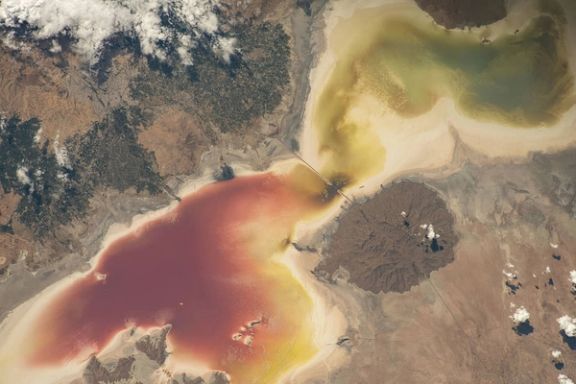
Iranians held a demonstration in the northwestern city of Tabriz on Saturday to protest mismanagement that has led to the disappearance of Lake Urmia.
The protesters gathered outside the provincial office of Iran’s Natural Resources and Watershed Management Organization, demanding the reopening of dams on rivers that feed the lake to resuscitate the dying hypersaline body of water.
Located between the provinces of East Azarbaijan and West Azarbaijan in northwestern Iran, Lake Urmia (Orumiyeh) was the largest lake in the Middle East and the sixth-largest saltwater lake on Earth with an original surface area of 5,200 square kilometers in the 1970s, or 2,000 square miles. It had shrunk to 700 sq km by 2013. The lake began shrinking in the 1980s due to water mismanagement and climate change.
During the demonstration, people chanted slogans such as "Lake Urmia is thirsty" and "Break the dams, fill Lake Urmia." In July 2022, a protest was also held and police arrested an unknown number of activists.
Once a thriving tourist hotspot with bustling hotels lining its shores and commercial ferries plying its waters, the lake currently hovers on the brink of utter disappearance. This dire situation is the result of a combination of factors, including prolonged droughts, excessive water consumption by local communities, and the ill-conceived construction of dams along its tributaries, all exacerbated by the regime's neglectful approach.
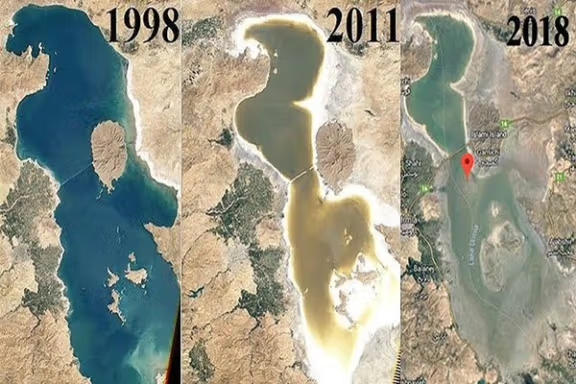
Experts say excessive and illegal groundwater extraction and using the water of the once bountiful Zarrineh Rud − which feeds Urmia Lake − for irrigating apple trees have both contributed to the lake shrinking by nearly 95 percent in volume over the past 20 years. In 2021 alone, more than 100,000 tons of apples of the province’s production went to waste.
Recent images capturing the last gasps of the lake depict a stark portrayal of its complete extinction and the severe environmental repercussions in the region. Nevertheless, regime officials still defend their actions with several phantasmagorical visions.
Ali Salajegheh, a vice president and the head of Iran's Department of Environment Protection, said during his visit to the region that “We hope that with substantial autumn rainfall, the situation of Lake Urmia will improve.”
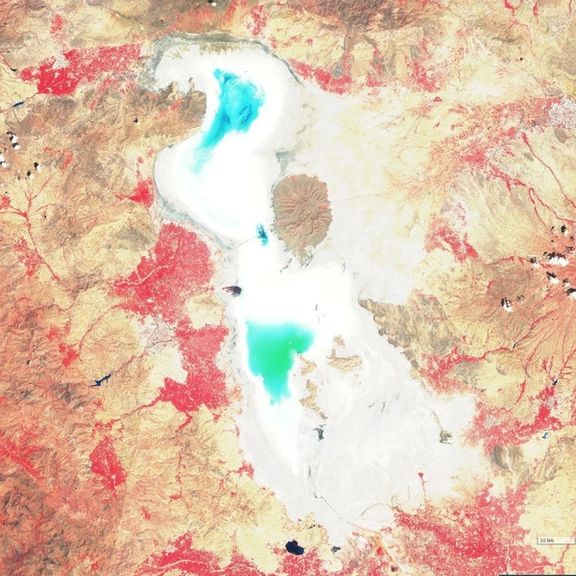
His claims came a day after Ramezan Sharif, the spokesperson of the Islamic Revolutionary Guard Corps (IRGC), described the public concern over the dying lake as an attempt by the critics of the regime to "undermine the authority of the Islamic Republic.” He claimed that "over the past 800 years, several lakes like Lake Urmia have dried up around the world, and these specific climate changes are not unique to Iran."
Fars news agency, affiliated with the Revolutionary Guard, quoted Salman Zaker – representative of the city of Orumiyeh in the parliament -- as saying on Saturday that the private sector can play a constructive role in saving the lake. "This is a demand shared by the public at large, and the government should engage the private sector in this endeavor. Thousands of residents of the region are eager to contribute to saving Lake Urmia by participating in the water transfer project from the Caspian Sea,” he said.
His remarks showed the attitude of regime insiders who make grandiose and baseless statements. Transferring water from the Caspian Sea hundreds of kilometers away would be a herculean task.
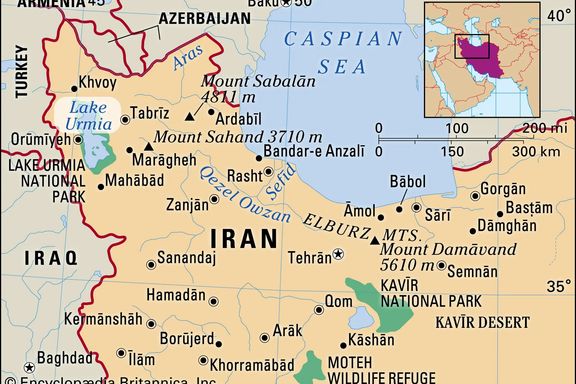
“Approximately 28 solutions have been considered for the revival of Lake Urmia," he said, claiming that “The results of the measures taken to revive Lake Urmia may not yet be tangibly evident... However, these actions can gradually lead to positive outcomes for the lake.”
Etemad, one of Tehran's prominent reformist dailies, said in an opinion piece on Saturday that studies indicate even the release of water from all upstream dams cannot revive Lake Urmia. Citing a study by researchers at Tehran’s Sharif University, the article said, "The water level of Lake Urmia on June 3, 2023, reached its lowest recorded level since measurements began, and now the volume of water is even lower than in 2015, the year when the lake's condition was announced as critical.”
In May, the former head of Iran's Environment Protection Organization warned that four million Iranians risk displacement if Lake Urmia dries up. “Transferring the residents of Tabriz to another place requires $500 billion while the cost of reviving the lake is about one billion dollars,” Issa Kalantari said, explaining that the salt dust would be unbearable for residents in Tabriz and its surrounding cities.
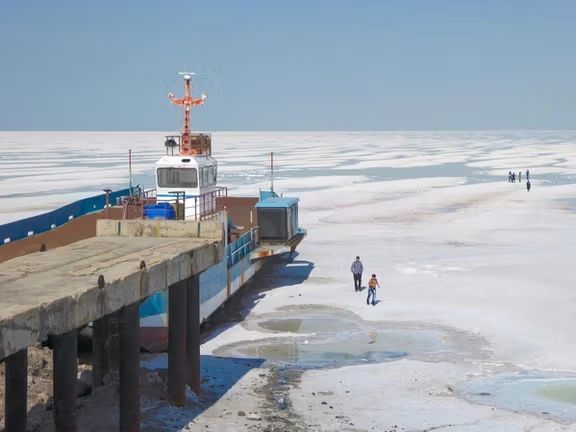
Last year, when the lake had shrunk by 95 percent, he said the fate of the Iranian regime is contingent on saving the lake. If the lake is not restored, it will have security consequences, and no government can survive in the country because it cannot withstand the flood of migration of millions of people who reside in the surrounding regions, he said.
The government of President Hassan Rouhani appropriated 150 trillion rials – in 2014 – equivalent to one billion dollars at the time - for a seven-year plan as well as another $10 million aid by Japan and some other pledges by the United Nations Food and Agriculture Organization (FAO) and the United Nations Development Program (UNDP) to save the lake. It is not clear whether or how the earmarked budgets were spent.

Shirin Ebadi, an Iranian jurist and recipient of the Nobel Peace Prize, addressed a gathering of Iranians outside the British Foreign Office on Saturday demanding the proscription of the IRGC.
Emphasizing the importance of unity and solidarity among Iranians against their shared adversary, the Islamic Republic regime, Ebadi remarked, "While the eventual downfall of the Islamic Republic appears inevitable, I hold the hope that we can draw valuable lessons from the preceding 44 years. Diverse as our perspectives may be, let us recognize that we share a common adversary, and thus, should refrain from internal discord."
The event, which marked the second day of protests by Iranians residing in Britain, witnessed participants advocating for the inclusion of the Revolutionary Guards in the British government's list of terrorist organizations. The protesters congregated to pay homage to Shapour Bakhtiar, the final Prime Minister under Mohammad Reza Shah Pahlavi, and Fereydoun Farrokhzad, an accomplished Iranian artist and activist who was killed in his apartment while in exile in Germany, by assassins believed to have been sent by Iranian intelligence.
While momentum builds for the international community to designate Iran's Revolutionary Guard Corps (IRGC) as a terrorist entity, the British government's response to such calls has yet to culminate in concrete action. Despite a unanimous resolution passed by the House of Commons in January, urging the government to proscribe the IRGC as a terrorist group, the process has encountered bureaucratic hurdles.
Shirin Ebadi's impassioned plea for unity resonated with Iranians gathered in London, highlighting the pressing need for collective determination in challenging the repressive Islamic Republic regime.
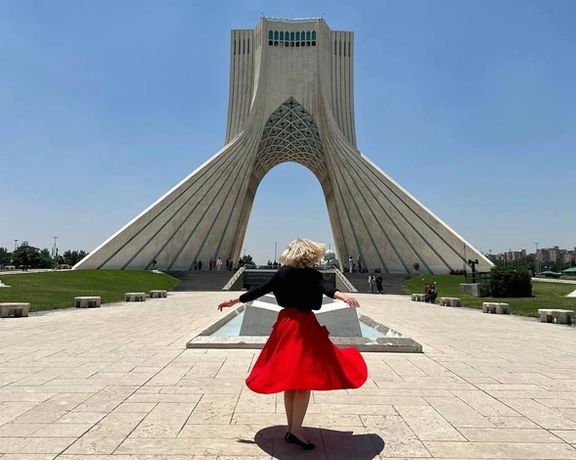
While updates about Iran’s contentious new hijab bill are trickling out, a newspaper in Tehran says the so-called morality police is still the regime’s preferred strategy.
Farhikhtegan newspaper, affiliated with Ali Akbar Velayati, a close advisor to Supreme Leader Ali Khamenei, said in an article published Saturday that a parliamentary committee in charge of the bill has eliminated the only possible benefit of the bill aimed at reducing police confrontations with people.
The main idea of the bill was to introduce a new way for hijab enforcement in the streets that would not lead to violent confrontation between police and people, reminiscent of the death of Mahsa Amini that ignited nationwide protests last September, shaking the foundations of the clerical regime. It put the emphasis on non-policing measures, rather than hijab patrols who confront the people on the streets.
The bill, which was sent to the Islamic Consultative Assembly by the administration of President Ebrahim Raisi, initially was comprised of only 15 articles. Now undergoing its final deliberations, it has become more unwieldy with 70 articles while the parliament has decided to discuss it without an open session in fear of further backlash.
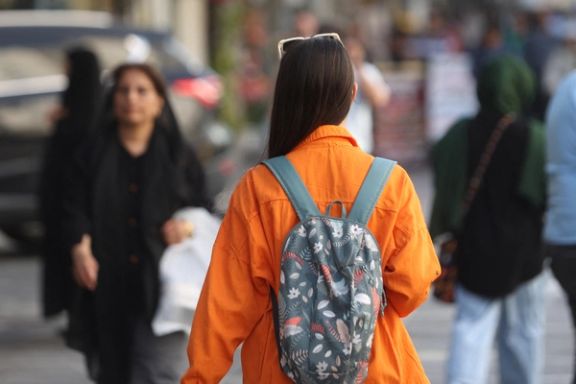
According to lawmaker Ahmad Naderi, a member of the parliament's presidium, a joint committee will make “the decision on the bill's passage into law discreetly and without being presented in the open session of the parliament.”
“The bill, fraught with suspicions and flaws both from a legal and societal perspective, has become a topic of national discussion,” said Farhikhtegan daily. “Now even more alarming news is being heard,” added the paper, explaining that lawmaker Amirhossein Bankipour has made the hijab patrols by police as the only viable option to crush the civil disobedience movement that is translated into society as women unveiling in public. “This means going back to square one,” said the article.
The uprising last September has made it increasingly difficult for the clerical regime to enforce the mandatory Islamic dress code. Since the beginning of the ‘Women, Life, Freedom’ movement, tens of thousands of girls and women have shed their compulsory hijab. The regime seeks to criminalize hijab defiance, but no branch of the government wants to be solely responsible for complications and the risk of social backlash.
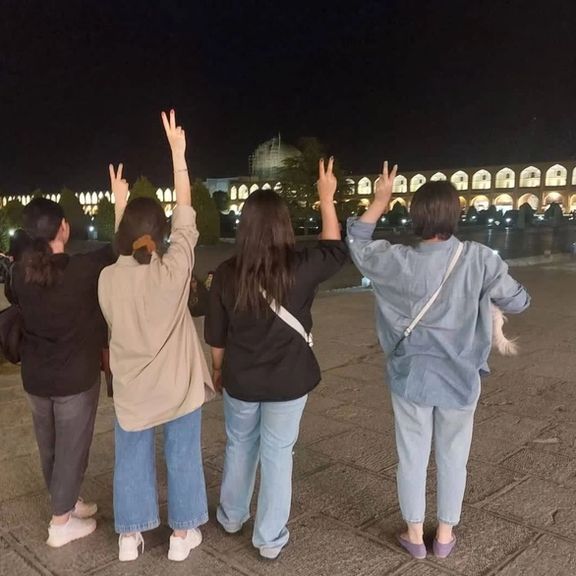
According to Farhikhtegan newspaper, the bill has evolved to the point where instead of rectifying the existing issues, its new addendums will further exacerbate the situation.
In recent weeks, the regime has intensified measures to intimidate people against defying hijab such as shutting down restaurants, cafes, small businesses and even online shops. The regime has also summoned students and has moved to make university lectures online in fear of renewed protests. However, the common belief is still the same: Regime cannot retain control of women’s dress code on streets.
Veteran hardliner lawmaker Hossein-Ali Haji-Deligani said that to keep its head above water, the regime must act promptly. “Every day, the situation worsens, thus requiring preventive actions; otherwise, we risk entering irrecoverable circumstances. Due to inaction, defiance against hijab has deteriorated further, and if we don't stop its progress, it will sweep us away,” he said, justifying the haste and secrecy in finalizing the hijab bill.
Responding to Haji-Deligani, political analyst Ali-Hossein Ghazizadeh said, “The regime is rushing to secretly approve the bill. This bill represents the last arrow in the quiver of the regime to confront the women who have come to make history. Mark my word! This bill does not work; the flood that has been unleashed will sweep you all away,” he said in a tweet.
Reformist activist Saeed Shariati quipped on a television debate earlier in the week that it is not "religious minorities" but the "irreligious majority" who do not adhere to the regime's interpretation of Islamic laws.